Sympathy Letter For Illness
[Your Name]
[Your Address]
[City, State, Zip Code]
[Email Address]
[Phone Number]
[Date]
[Recipient's Name]
[Recipient's Address]
[City, State, Zip Code]
Dear [Recipient's Name],
I hope this letter finds you in the best possible spirits despite the challenging circumstances you are currently facing. I was deeply saddened to learn about your illness, and I wanted to reach out and express my sincerest sympathy and support during this difficult time.
I can only imagine how tough it must be for you, both physically and emotionally, to cope with the uncertainty and the pain that comes with an illness. Please know that you are not alone; you have friends and family who care deeply about you and are here to offer their unwavering support and love.
Your strength and resilience have always been an inspiration to those around you. I have witnessed your bravery and determination in various aspects of life, and I believe that these qualities will serve as pillars of strength in your battle against this illness. Remember, you have faced challenges before and emerged victorious, and I have no doubt that you will overcome this one too.
During these trying times, it's essential to lean on the people who care about you. Reach out to your loved ones, share your thoughts and feelings, and allow them to be there for you. They want to be your support system and provide comfort during this difficult journey.
I want you to know that I am just a phone call away, and I would be honored to be a part of your support network. Whether it's a shoulder to lean on, someone to talk to, or assistance with daily tasks, please don't hesitate to ask. Your well-being means a lot to me, and I am more than willing to help in any way I can.
Lastly, remember to take care of yourself not only physically but also emotionally and mentally. Engage in activities that bring you joy, surround yourself with positivity, and maintain hope for a brighter tomorrow.
Please keep me informed about your progress, and if there's anything specific you need or want, please don't hesitate to let me know. My thoughts and prayers are with you, and I have faith that you will overcome this challenge with the grace and strength that define your remarkable character.
Sending you all my love, support, and warm wishes for a speedy recovery.
With deepest sympathy,
[Your Name]
Heartfelt Message for Close Friend with Serious Illness
Subject: Thinking of You During This Difficult Time
My Dear [Name],
I was heartbroken to hear about your diagnosis. I know how scary and overwhelming this must feel right now, and I want you to know that you're not facing this alone.
You've always been such a source of strength and joy in my life, and I believe with all my heart that same strength will carry you through this challenge. I've seen you overcome obstacles before with such grace and determination.
Please don't hesitate to reach out if you need anything at all - whether it's someone to drive you to appointments, help with groceries, or simply someone to sit with you and watch terrible movies. I'm here for whatever you need, no questions asked.
I'm sending you all my love and positive thoughts for your recovery. Take things one day at a time, and remember that so many people are rooting for you.
With all my love and support,
[Your name]
Professional Email for Colleague's Extended Illness
Subject: Wishing You a Speedy Recovery
Dear [Name],
I hope this email finds you in good spirits despite the circumstances. I wanted to reach out to let you know that you're in our thoughts during your recovery.
Please focus entirely on getting better - we have everything covered here at the office. The team has stepped up to handle your current projects, so there's absolutely no need to worry about work matters right now.
We miss your positive energy and expertise around the office, but your health is the absolute priority. Take all the time you need to recover fully.
If there's anything we can do to support you during this time, please don't hesitate to let us know. We're all looking forward to having you back when you're feeling better.
Best wishes for a swift and complete recovery.
Warm regards,
[Your name]
[Your title]
Gentle Message for Elderly Family Member
Subject: Sending Love and Warm Wishes
Dearest [Name],
I've been thinking about you so much since hearing about your recent health concerns. I know this isn't easy, but I want you to know how much you mean to all of us.
Your stories, wisdom, and loving presence have shaped our entire family. The strength and resilience you've shown throughout your life continue to inspire us all.
I hope you're comfortable and surrounded by love. Please know that we're all here for you, ready to help in any way we can. Whether you need company, assistance with daily tasks, or just someone to listen, we're only a phone call away.
Rest well, take your medications as prescribed, and don't try to do too much too soon. Your body needs time to heal, and we need you to take care of yourself.
You are so deeply loved and cherished. I'll be visiting soon to give you a proper hug.
All my love,
[Your name]
Casual Message for Acquaintance's Minor Illness
Subject: Hope You're Feeling Better Soon
Hi [Name],
Just heard you've been under the weather lately. That's such a bummer, especially with everything you've got going on.
Hope you're getting plenty of rest and taking it easy. Sometimes our bodies just need us to slow down for a bit, even when we don't want to!
If you need anything while you're recovering - maybe some soup delivery or someone to walk your dog - just let me know. I'm happy to help out.
Get well soon! Can't wait to see you back to your usual energetic self.
Take care,
[Your name]
Formal Letter for Business Associate's Illness
Subject: Our Thoughts Are With You
Dear [Name],
We were sorry to learn of your recent illness and wanted to extend our sincere wishes for your swift recovery.
Your professionalism and dedication have always been greatly appreciated, and we understand that your health must be your primary concern at this time. Please know that we fully support your need to focus on getting well.
We look forward to working with you again once you have fully recovered. Until then, please take all the time you need and don't worry about any business matters.
Our entire team joins me in wishing you the very best during your recovery.
Sincerely,
[Your name]
[Your title]
[Company name]
Encouraging Email for Someone with Chronic Illness
Subject: You're Not Alone in This Journey
Dear [Name],
I know living with [condition] brings daily challenges that others might not fully understand, and I want you to know how much I admire your courage in facing each day.
Your strength doesn't go unnoticed. The way you continue to find joy, maintain relationships, and pursue your passions despite the obstacles is truly inspiring. You're teaching all of us about resilience and grace.
Please remember that it's okay to have difficult days. It's okay to need help, to feel frustrated, or to just want someone to understand. I'm here to listen without judgment whenever you need to talk.
You're fighting a battle that takes incredible strength, and you're doing it with such dignity. I'm honored to be your friend and to witness your journey.
Thinking of you always and sending love.
[Your name]
Quick Message for Neighbor's Flu
Subject: Feel Better Soon!
Hi [Name],
Just wanted to drop a quick note to say I hope you're feeling better soon! I know the flu has been going around, and it's really knocked people out.
If you need anything from the store or want me to grab your mail while you're resting, just text me. It's no trouble at all.
Get lots of rest and stay hydrated. You'll be back on your feet in no time!
Feel better,
[Your name]
Heartfelt Letter for Child's Illness
Subject: Sending Healing Thoughts to Your Little One
Dear [Parent's name],
My heart goes out to you and [child's name] during this difficult time. I can only imagine how worried and exhausted you must be feeling right now.
[Child's name] is such a brave and special little one, and I know they're getting the very best care from you and the medical team. Children have an amazing ability to bounce back, and I have every confidence that [he/she] will get through this.
Please don't hesitate to reach out if you need anything at all - meals, help with other children, errands, or just someone to talk to who understands. Sometimes just having another adult handle the little things can make such a difference.
You're being so strong for your family right now, but remember to take care of yourself too. Your child needs you healthy and rested.
Sending healing thoughts to [child's name] and strength to your entire family.
With love and support,
[Your name]
What Is a Sympathy Letter for Illness and Why Send One
A sympathy letter for illness is a written expression of care, concern, and support sent to someone who is dealing with health challenges. These messages serve multiple important purposes: they provide emotional comfort during vulnerable times, demonstrate that the person is not forgotten or alone, and offer practical support when needed.
Unlike sympathy letters for death or loss, illness sympathy messages focus on hope, recovery, and ongoing support. They acknowledge the difficulty of the situation while maintaining an optimistic outlook for healing and improvement.
When to Send Sympathy Messages for Illness
- When someone receives a serious medical diagnosis
- During extended hospital stays or treatments
- For chronic illness flare-ups or ongoing struggles
- After surgery or medical procedures
- When someone is experiencing mental health challenges
- For workplace colleagues who are on extended medical leave
- During recovery periods following accidents or injuries
- When elderly relatives face age-related health issues
- For children dealing with illness (sent to parents)
- During epidemic outbreaks affecting community members
Who Should Send These Messages
- Close family members and relatives
- Friends and social circle members
- Workplace colleagues and supervisors
- Neighbors and community members
- Religious or spiritual community leaders
- Teachers (for student families)
- Business associates and professional contacts
- Healthcare providers (in appropriate circumstances)
- Club or organization members
- Anyone who has a meaningful relationship with the ill person
Formatting Guidelines and Best Practices
Length: Keep messages between 3-8 sentences for casual notes, 2-4 paragraphs for closer relationships.
Tone: Match your relationship - formal for business contacts, warm and personal for family and friends, encouraging for chronic conditions.
Delivery method: Email or text for immediate support, handwritten cards for more formal sympathy, care packages with printed notes for special gestures.
Timing: Send within a few days of learning about the illness, but messages are welcome throughout recovery periods.
Language: Use positive, hopeful language while acknowledging difficulties. Avoid medical advice or overly optimistic predictions about recovery timelines.
Essential Elements to Include
- Acknowledgment: Recognize their situation without dwelling on details
- Emotional support: Express care, concern, and empathy
- Specific offers of help: Concrete assistance rather than vague "let me know if you need anything"
- Personal connection: Reference shared memories or qualities you admire
- Hope and encouragement: Positive but realistic outlook
- Respect for privacy: Don't ask for medical details
- Appropriate closing: Match the formality level of your relationship
Common Mistakes to Avoid
- Asking for specific medical information or details about diagnosis
- Making comparisons to others who had similar illnesses
- Offering unsolicited medical advice or alternative treatment suggestions
- Using overly religious language unless you know it's welcome
- Making promises you can't keep about visiting or helping
- Focusing too much on your own feelings rather than theirs
- Sending overly long messages that feel overwhelming
- Using clichés like "everything happens for a reason"
- Mentioning how "strong" they are in ways that minimize their struggle
- Waiting too long to send the message
Smart Tips and Best Practices
- Be specific with offers: "I'll drop off dinner Tuesday" instead of "let me know if you need food"
- Follow their lead: If they want to discuss the illness, listen. If not, respect that boundary
- Send multiple brief messages: Rather than one long letter, consider periodic check-ins
- Include others: Coordinate with family members to avoid overwhelming them
- Consider practical needs: Meal delivery, transportation, childcare, pet sitting
- Respect treatment schedules: Don't expect immediate responses during intensive treatment periods
- Remember ongoing conditions: Chronic illness needs long-term support, not just initial sympathy
- Use their preferred communication method: Some prefer texts, others want calls or cards
Pros and Cons of Sending Sympathy Messages
Advantages:
- Provides emotional comfort and reduces isolation
- Shows the person they're valued and remembered
- Opens channels for practical assistance
- Strengthens relationships through shared difficult times
- Can boost morale and aid in psychological healing
Potential drawbacks:
- May feel overwhelming if person receives many messages
- Could unintentionally pressure them to respond when they're unwell
- Risk of saying something insensitive despite good intentions
- Might highlight their condition when they prefer normalcy
- Could create obligation to update people on their condition
Follow-up and After Sending
- Don't expect immediate responses - illness affects energy and communication ability
- Send periodic check-ins, especially for longer illnesses
- Remember important dates like treatment milestones or surgery dates
- Continue offering specific help throughout recovery
- Celebrate improvements and small victories with them
- Respect if they need space or time without contact
- Be prepared for mood changes and difficult days
- Include them in normal social activities when appropriate and they're able
- Adjust your support style based on their recovery progress

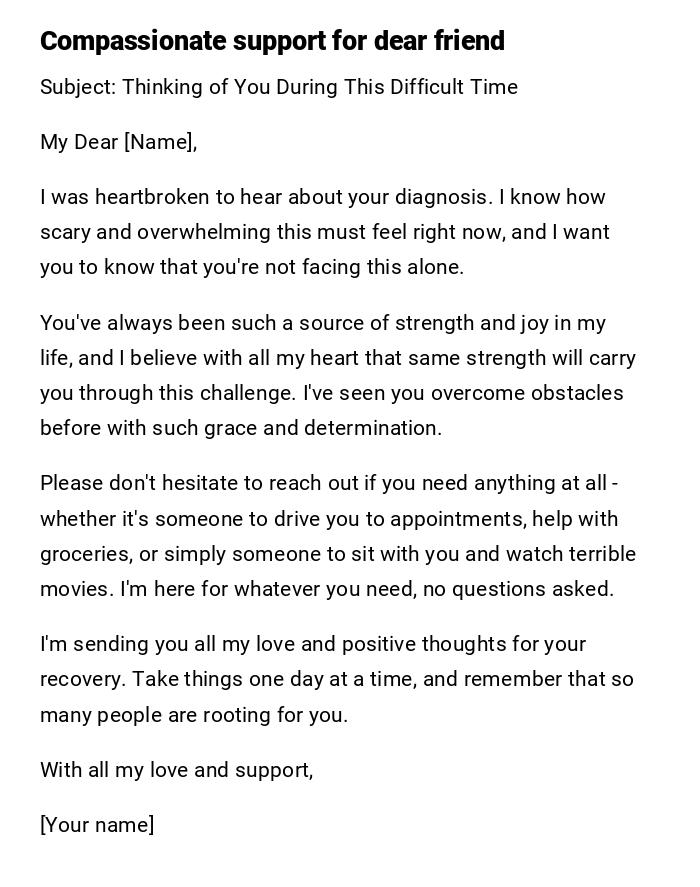
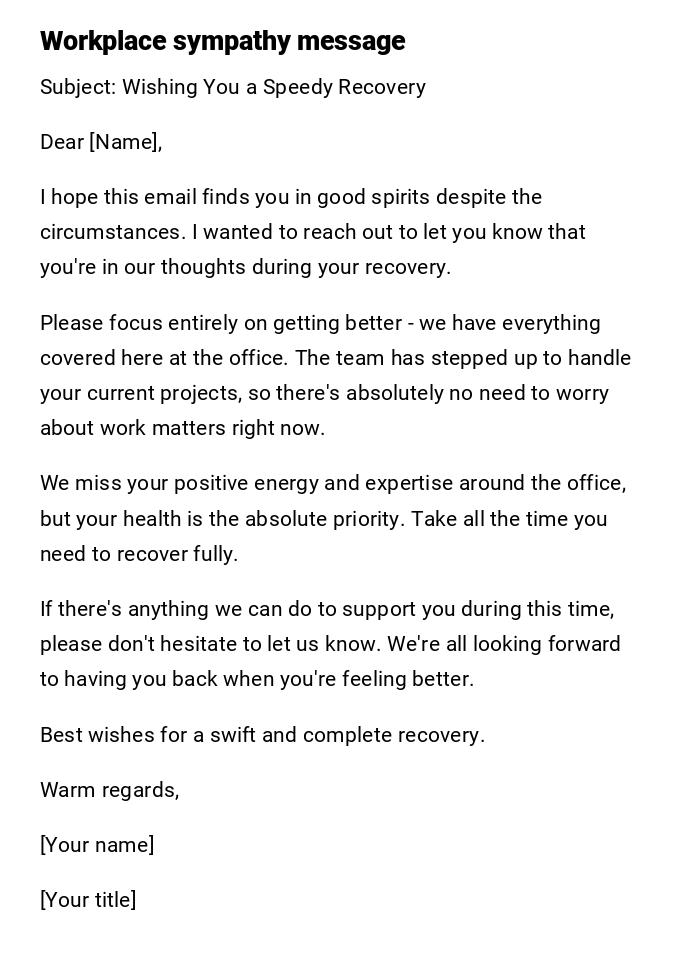
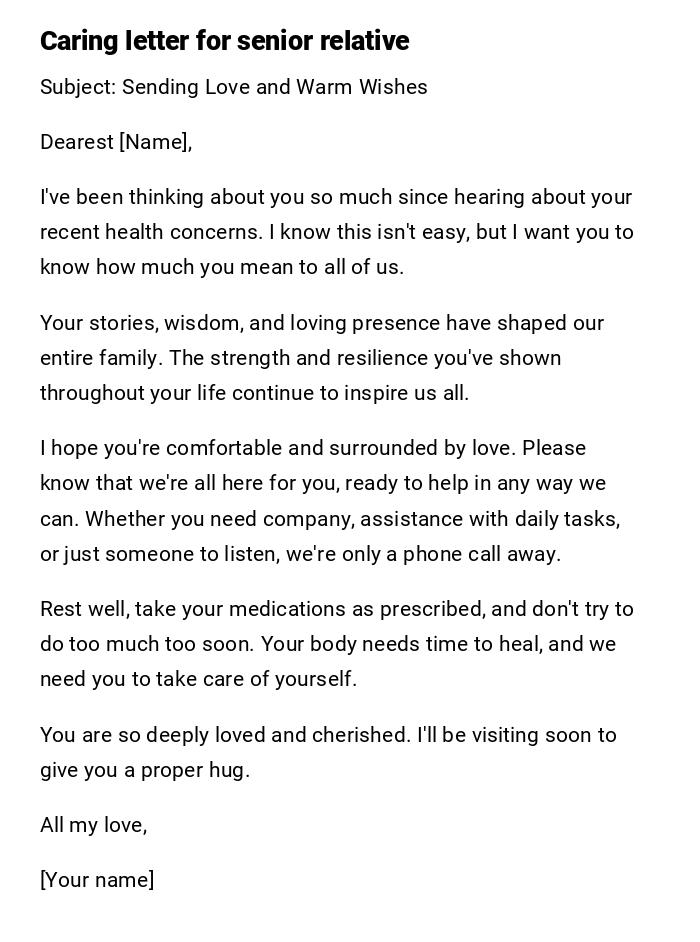
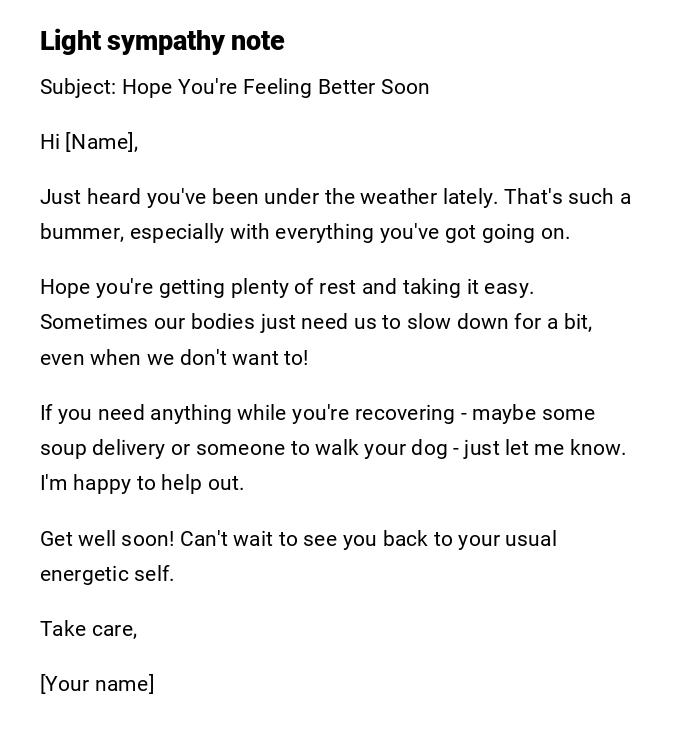
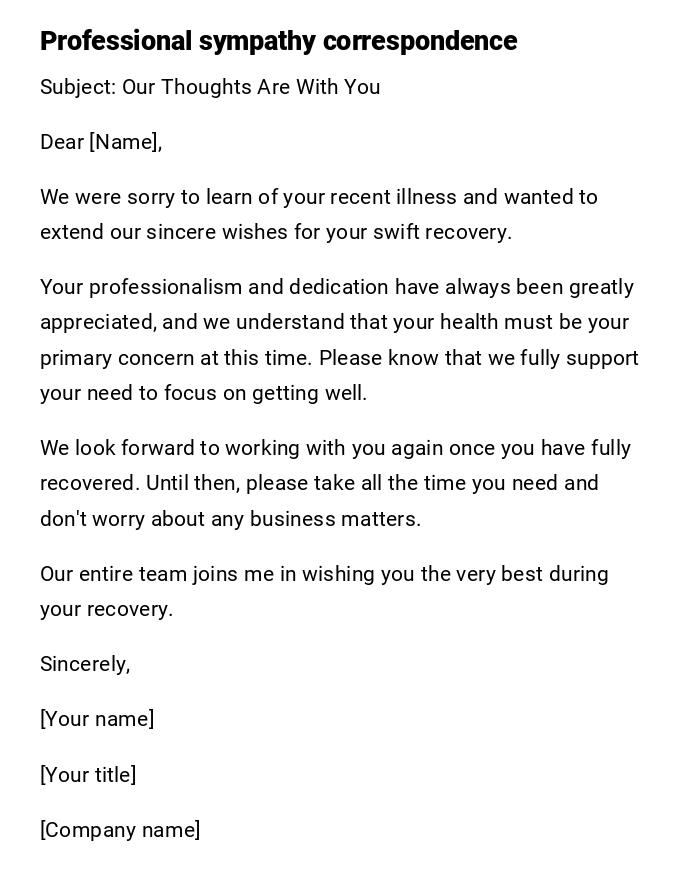
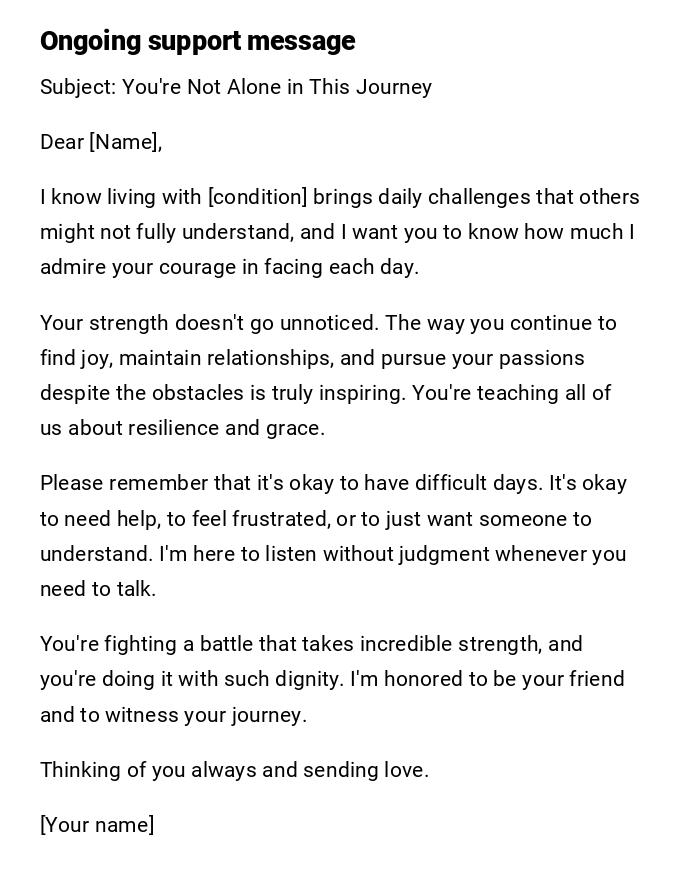
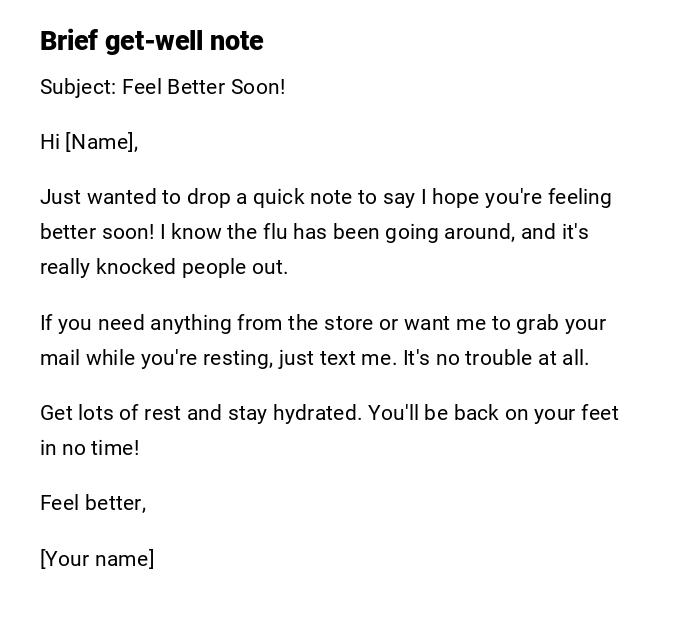
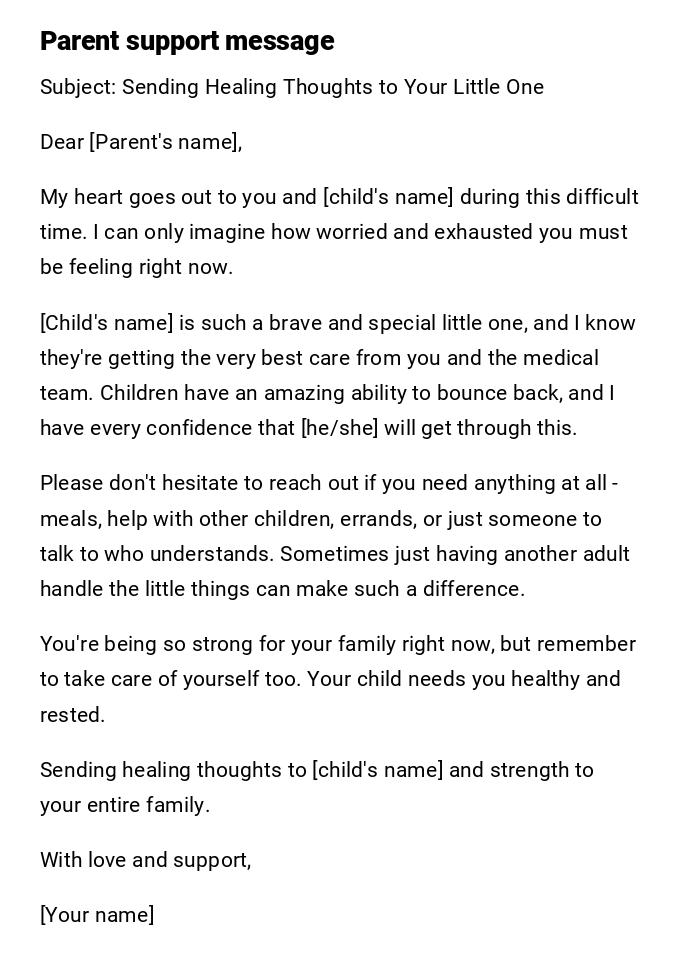

 Download Word Doc
Download Word Doc
 Download PDF
Download PDF